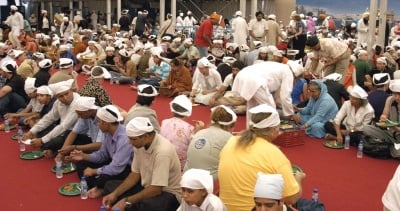Langar-free food history
Langar
| Part of a series on Sikh Practices |
| Sikhism |
| Sanskar |
| Sikh rites |
| Personal 5 Banis . Five ks |
The Langar or free community kitchen is a hallmark of the Sikh faith. It was established by the first Guru of Sikhism, Guru Nanak Dev Ji, around the year of 1481. It is designed to uphold the principle of equality between all people of the world regardless of religion, caste, colour, creed, age, gender, or social status; to eliminate the extreme poverty in the world, and to bring about the birth of "caring communities". In addition to the ideals of equality, the tradition of Langar expresses the ethics of sharing, community, inclusiveness, and oneness of all humankind. "..the Light of God is in all hearts." (Guru Granth Sahib, 282)
For the first time in history, Guruji designed an institution in which all people would sit on the floor together, as equals, to eat the same simple food. It is here that all people high or low, rich or poor, male or female, all sit in the same pangat (literally "row" or "line") to share and enjoy the food together.
The institution of Guru ka Langar has served the community in many ways. It has ensured the participation of women and children in a task of service for mankind. Women play an important role in the preparation of meals, and the children help in serving food to the pangat. Langar also teaches the etiquette of sitting and eating in a community situation, which has played a great part in upholding the virtue of sameness of all human beings; providing a welcome, secure and protected sanctuary.
Everyone is welcome to share the Langar; no one is turned away. The food is normally served twice a day, every day of the year. Each week a family or several families volunteer to provide and prepare the Langar. This is very generous, as there may be several hundred people to feed, and caterers are not allowed. All the preparation, the cooking and the washing-up is done by volunteers and or by voluntary helpers (Sewadars).



Comments
Post a Comment